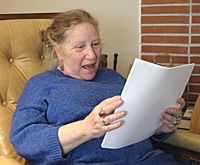Diane di Prima facts for kids
Quick facts for kids
Diane di Prima
|
|
|---|---|

Diane di Prima, photo by Gloria Graham during the video taping of Add-Verse, 2004
|
|
| Born | August 6, 1934 Brooklyn, New York, U.S. |
| Died | October 25, 2020 (aged 86) San Francisco, California, U.S. |
| Occupation |
|
| Nationality | American |
| Education | Hunter College High School |
| Alma mater | Swarthmore College |
| Literary movement | Beat movement |
| Years active | 1958–2020 |
|
|
|
Diane di Prima (born August 6, 1934 – died October 25, 2020) was an American poet. She was a well-known figure in the Beat movement, a group of writers and artists who challenged traditional ideas in the 1950s and 60s. Diane di Prima was also an artist, a writer of stories, and a teacher. Her most famous work is often thought to be Loba, a long collection of poems.
Contents
Early Life and Education
Diane di Prima was born in Brooklyn, New York, on August 6, 1934. Her family came from Italy. Her father, Francis, was a lawyer, and her mother, Emma, was a teacher. Her grandfather, Domenico Mallozzi, was an activist. He was involved with people like Carlo Tresca and Emma Goldman, who believed in different ways of organizing society. Diane changed her last name to "di Prima" to show her Italian heritage.
She went to Hunter College High School, a special school for smart students. There, she joined a small group of friends, including Audre Lorde. They called themselves "the Branded" and loved poetry. They would skip classes to explore the city, visit bookstores, share their own poems, and even hold pretend meetings with dead poets.
After high school, di Prima attended Swarthmore College. However, she soon left college to become a poet in Manhattan. She started writing when she was a child. By age 19, she was writing letters to famous poets like Ezra Pound. Her first book of poems, This Kind of Bird Flies Backward, was published in 1958.
Her Life as a Writer
Diane di Prima spent the late 1950s and early 1960s in Manhattan. Here, she became an important part of the new Beat movement. She also spent time in California before moving to San Francisco for good.
She helped create a newspaper called The Floating Bear with Amiri Baraka. She also helped start the New York Poets Theatre and founded the Poets Press. In 1961, she faced trouble from the Federal Bureau of Investigation (FBI) because of two poems she published. Diane di Prima said that police often bothered her because of her poetry.
From 1974 to 1997, di Prima taught poetry at the Jack Kerouac School of Disembodied Poetics. This school is part of the Naropa Institute in Boulder, Colorado. She taught there with other famous Beat poets like Allen Ginsberg and William Burroughs.
Later Creative Works
In the late 1960s, di Prima moved to California permanently. There, she became involved with a group called the Diggers. She also studied Buddhism, Sanskrit (an ancient language), and other spiritual ideas. In 1966, she signed a promise to not pay taxes that supported the Vietnam War. In the 1970s, she published Revolutionary Letters, a collection of poems influenced by her time with the Diggers.
Her most important work, the long poem Loba, was first published in 1978. An expanded version came out in 1998. Starting in the 1960s, she also worked as a photographer and made collage art. Later in her life, she began watercolor painting.
From 1980 to 1987, di Prima taught about spiritual traditions in poetry. She did this at the New College of California. She also taught at the San Francisco Art Institute. She helped start the San Francisco Institute of Magical and Healing Arts (SIMHA). There, she taught about Western spiritual traditions from 1983 to 1992.
In 2009, Diane di Prima was named San Francisco's poet laureate. This is an honor given to a poet who represents a city.
Activism and Beliefs
Diane di Prima was known for her activism. She learned about political ideas early in life from her grandfather, Domenico. She wrote about this in her memoir, Recollections of My Life as a Woman. In an interview, she also talked about her grandfather's influence.
In her memoir, di Prima described seeing her grandfather speak at a public gathering. She wrote that she felt proud and amazed. She felt his words were true and that she had always known them. These moments sparked her strong dedication to social activism. She especially cared about women's rights throughout her life.
Death and Legacy
Diane di Prima passed away on October 25, 2020, in San Francisco. She was 86 years old. She had been dealing with several health issues, including Parkinson's disease. However, her mind remained sharp. She was still working on several books just two weeks before she died.
Diane di Prima's writings and papers are kept in special collections. You can find them at places like the University of Louisville and Indiana University.
See also
 In Spanish: Diane di Prima para niños
In Spanish: Diane di Prima para niños
 | Misty Copeland |
 | Raven Wilkinson |
 | Debra Austin |
 | Aesha Ash |

